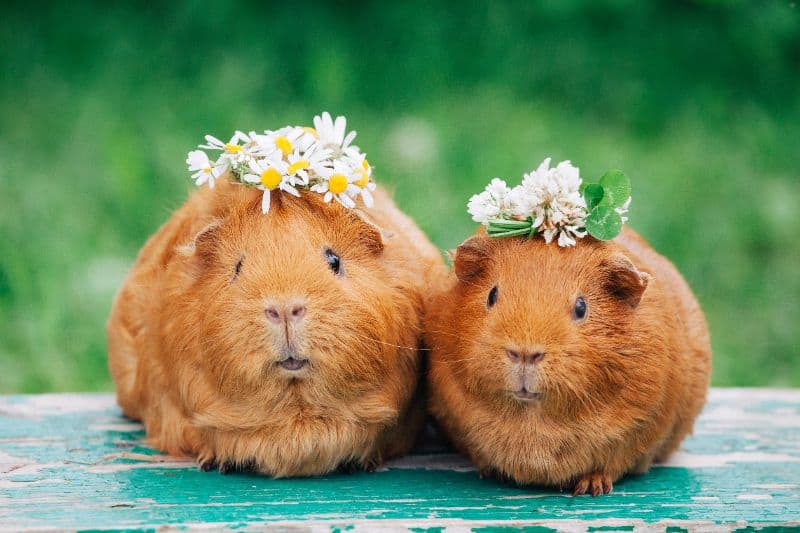Cuteness Overload: Guinea Pig Care and Keeping

Ever so adorable and endearing, guinea pigs have long-enjoyed their status as popular family pets, particularly for those looking to adopt a fur-friend that is both inexpensive and non-destructive.
That said, there are also a slew of popular misconceptions about guinea pigs. These misnomers include the belief that they are low-maintenance pets who do not require much space, social interaction, or veterinary care.
Whether you are considering adopting a guinea pig, or already have, it’s important to educate yourself on guinea pig care and what these adorable creatures need to not only survive, but thrive as a member of your furry family.
Home Sweet Guinea Pig Home
While guinea pigs do not require as much room to roam as, say, a cat or dog, they do require considerably more space to thrive than most people think. Not only do they require a roomy cage, but they also require additional space outside their cage to romp around in daily.
Typically a guinea pig requires a cage or hutch ranging from a minimum of 10.5 square-feet for two guinea pigs, including additional space for fun, frolic, and proper exercise. Cages should be at least 18 inches tall, to avoid the need for a lid. This space is not only needed for proper hygiene, but also to limit behavioral issues and support their overall mental health and physical wellness.
Your guinea pig’s cage should reside indoors, in a high-traffic area (again, guinea pigs are social creatures), that receives adequate (but not direct) sunlight and that remains a consistent temperature of 65-75’ fahrenheit. Likewise, you will want to avoid cages with wire flooring, as your guinea pig’s feet can get caught in the in-between spaces, resulting in stress and injury. Guinea pigs are also sensitive to noise, so you’ll want to take care to avoid locations that are close to the TV, stereo, or other noisy locations in the home.
When the weather is right, your guinea pig’s exercise area can be located outdoors (with your supervision, of course) in a grassy or garden-like area. Otherwise, you’ll need to create a safe place for your cutie to play indoors.
Inside your guinea pig’s cage, you’ll want to provide:
- A water bottle and food bowl
- A hay holder
- A hidey-hole or two
- Chew toys
- A revolving supply of aspen / pine chips
- A steady supply of Timothy hay, orchard grass, or oat grass
- A combination of fleece and recycled paper bedding is recommended as wood bedding can be too abrasive or potentially toxic (cedar) to guinea pigs. Guinea pigs can also be provided litter boxes with paper bedding and hay. They will often choose to eliminate in private areas where their hay is provided!
Tooth and Nail: Guinea Pig Wellness, Grooming, and Nutrition
Your guinea pig will require basic veterinary care to ensure that their health and overall wellness is on track. You’ll also want to discuss whether your guinea pig requires any vaccinations, should be spayed or neutered, or will require microchipping.
You may be surprised to learn that guinea pigs need regular grooming as well, including nail trimmings and regular brushing. Guinea pigs are also at risk for a condition known as malocclusion.
Like rabbits, guinea pig’s teeth do not stop growing once they have reached maturity. Because of this, if a guinea pig is not fed a diet containing enough roughage to continuously wear the teeth down to a healthy length, a host of complications can occur, which will require veterinary intervention.
Keeping malocclusion in mind, you’ll want to be mindful of your guinea pig’s diet. High sugar foods & grains should be avoided. Additionally, guinea pigs are naturally vegan, so you will need to avoid any foods that break that rule, including milk, cheese, eggs, meats and so forth. It’s also worth noting that guinea pigs don’t make their own vitamin C, so foods containing this vitamin are needed, as to avoid scurvy!
A varied and healthful guinea pig diet should include:
- Daily dose of 25mg Vitamin C should be administered
- Approximately 1/8 cup of vitamin C-fortified commercial pellets per day
- A daily allotment of Timothy hay
- A daily dose of fresh fruits and vegetables, including leafy greens, broccoli, peppers and / or tomatoes
- The inclusion of carrots, zucchini, or sweet potato once or twice a week
- The occasional addition of grasses should be mixed into their pellets
The Social Guinea Pig
As we have mentioned, guinea pigs are highly social creatures who absolutely require daily interaction with their humans.
In addition to their people time, it is imperative that guinea pig owners adopt more than one guinea pig at a time, so that they have a BFFF (best fur-friend forever) to avoid depression and the behavioral issues that develop from isolation and loneliness.
It’s also worth noting that, with time and proper introductions that guinea pigs can also befriend the family dog (if they are of the right temperament). Seeing your sweet piggie snuggling Fido can be absolutely adorable and make for a sweet photo op.
Guinea Pig Care Questions
As you can see, guinea pig ownership requires more than most first-time owners anticipate, but with education and support, these sweet critters can make adorable pets. If you have any questions concerning guinea pig care, or if you would like to schedule a pocket pet wellness appointment, please don’t hesitate to contact your veterinary team at Dupont Veterinary Clinic.
